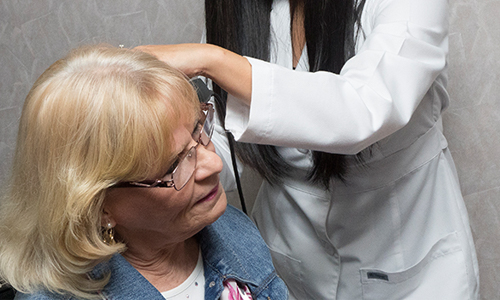How Audiology Testing Helps Prevent Hearing Loss
As can so often be the case with different illnesses and parts of the body, we don’t really pay that much attention to our hearing until it starts to decline. In fact, the majority of adults haven’t had a hearing test in decades. Similarly, to your vision, when hearing starts to fade, many adults don’t recognize the change at first. It’s not until significant hearing loss is detected, do people often seek medical attention.
What causes hearing loss?
A variety of factors can lead to a loss in hearing. The most common causes of hearing loss in adults are noise exposure and aging. From age to lifestyle factors, understanding what causes damage to your hearing ability can help you prevent it.
∞ Noise – In the U.S. alone, 10 million people have a hearing loss caused by noise exposure. One out of every three people has a hearing loss at 65 years of age, and 60 percent of the people with hearing loss are still working. Noise induced hearing loss can happen gradually or suddenly. One single shot from a large firearm can cause permanent damage. Working in factories/plants, construction, military, concerts, hunting, etc. are high risk factors for noise induced hearing loss.
∞ Age – Even with regular audiology testing, age can play a part in your hearing. Age-related hearing loss, also known as presbycusis, can be caused by gradual changes in the inner ear, middle ear, or neural pathways from the ear to the brain. It can also be due to other conditions such as high blood pressure or diabetes.
∞ Disease – Unexpected illnesses like mumps and measles, or benign growths and tumors on the hearing nerve, can disrupt or damage your hearing.
∞ Infections – A middle-ear infection (collection of fluid in the middle ear). This is often caused by head colds, allergies, sore throat or inflamed tonsils.
∞ Wax – Wax can store in the ear canal, causing difficulty for sounds to pass through the canal. An audiologist or nurse can remove the build-up.
Types of audiology testing
Audiology testing can help you prevent hearing loss, while supporting your over-all wellbeing. Audiology services at Vision Institute of Michigan can help identify and assess your hearing and balance problems. Common audiology testing that may be performed during your visit includes:
∞ Basic audiogram – Used to measure your hearing ability compared to normal adult hearing levels. This test is often used to determine if medical or surgical procedures may be needed.
∞ Tympanometry – Used to determine the functionality level of the middle ear. Middle ear blockages may be detected through this test.
∞ Stapedial reflexes – Used to determine the ability of the auditory nerve to carry hearing signals to the brain. Blockages on this pathway could greatly disrupt your hearing ability.
∞ Sentence in noise test – Used determine the ability to understand normal voice tones and words during conversation. This test could allow your audiologist to determine the need and benefit of a hearing aid.
Types of hearing loss
∞ Conductive – Sounds are blocked from being carried to the inner ear because the outer or middle ear fails to work properly. A common cause of conductive hearing loss is fluid build-up behind the eardrum or wax in the ear canal. This type of hearing loss is often treatable with medicine or surgery.
∞ Neural – Aging or a growth or tumor pressing on the hearing nerve can cause neural hearing loss. Hearing aids may help better the quality of sound.
∞ Sensory – Aging, inner-ear infection and noise exposure are the most common types of sensory hearing loss. This type of hearing loss is not typically treated with medicine or surgery, but hearing aids can be beneficial.
Hearing loss is usually gradual, developing over a long time. Regular audiology testing can help prevent unnecessary hearing loss and allow you to become aware of warning signs that your hearing is disrupted.
Schedule Your Audiology Test Today
Contact Vision Institute Michigan today to schedule you hearing test. Our audiologist specialist, Dr. Tracy, does a comprehensive hearing evaluation and will determine the necessary follow-up and treatment plan.

